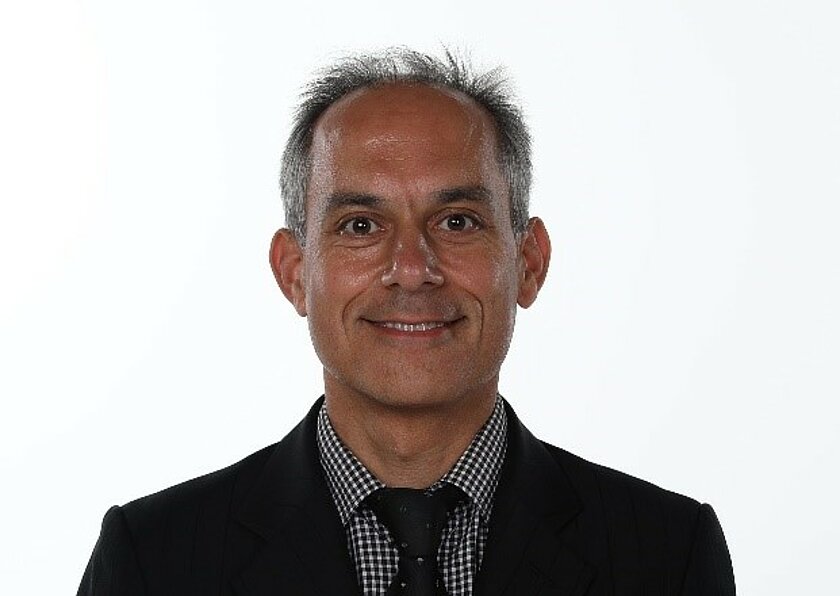The interview partners
Prof. Dr. Patrick Da-Cruz is Professor of Business Administration and Healthcare Management at the Faculty of Healthcare Management at Neu-Ulm University of Applied Sciences (HNU) and Academic Director of the MBA program Leadership and Management in Healthcare.
Before joining the HNU, Mr. Da-Cruz worked for renowned strategy consultancies in the pharmaceutical/healthcare sector and in management positions in companies in the healthcare industry in Germany and abroad.

Dr. Philipp Schwegel is Strategic Account Manager for Medtronic, a multinational medical device company. He studied at the Universities of Bayreuth, Ansbach, Joplin (Missouri, USA) and Aalborg (Denmark). Before joining Medtronic, Philipp worked as a consultant at Oberender & Partner and at the orthopaedics group Biomet. He is an enthusiastic long-distance runner and inland fisherman.

What is meant by intelligent medical devices compared to traditional medical devices?
Dr. Philipp Schwegel: Traditional means without electricity and sensors. Nevertheless, they can be highly innovative, as shown by the latest generation of transcatheter valves. They are durable and easy for users to use, but unfortunately they do not generate any data. Medical devices are intelligent when they automatically generate therapy-relevant information that can be analyzed and networked in a structured manner. Algorithms are used to mimic neural networks for better decision-making. Eric Topo, an American AI enthusiast, refers to this as deep medicine.
Could you give us some specific examples of intelligent medical products and their applications?
Dr. Philipp Schwegel: There is a huge variety and it is growing all the time. Behind this is the major trend in the medical device industry towards more benefits for users and patients. Engineering expertise is being supplemented and enriched with IT. We are in the midst of a transformation from a hardware to a software industry. The World Economic Forum speaks of the fourth industrial revolution, which is being driven by AI. Well-known intelligent medical products include capsule endoscopy with computer-aided polyp detection and implantable heart monitor systems with algorithms for detecting cardiac arrhythmia.
AI and robotics are currently experiencing a great deal of hype. Some research institutes are predicting that Dr. Google will soon be operating on patients. How much can be automated in medicine?
Dr. Philipp Schwegel: Enormous innovations are currently taking place in both areas. More and more surgical robots are being installed in German clinics. It all started around 20 years ago in urology - particularly with regard to the removal of the prostate. The field of application has now expanded significantly to include gynecology, thoracic and visceral surgery and orthopedics. There are two different technologies. The first is robot-assisted surgery. Here, the surgeon controls the robot's arms, instruments and camera with two hand movements. The surgeon is purely a vicarious agent. There is no automation. On the other hand, there are robots that take up a position independently, for example on the basis of CT images and with the aid of navigation, in order to precisely place screws in the spine, for example. The robot acts autonomously within a limited field of action.
In my view, fully automated operations along the lines of autonomous driving are not desirable. They would certainly be technically feasible within the next 10 to 15 years, but I cannot imagine that surgeons will completely hand over control and intervention options to a machine, however intelligent it may be. Partial automation will continue to advance and reach previously unimagined levels, but always under the responsibility of the person performing the operation.
Will there be a robot for everything in surgery in the future?
Dr. Philipp Schwegel: I don't think so. The various specialist disciplines are too different in their surgical methods and instruments for that. At a high level, I differentiate between hard tissue and soft tissue systems. I'm leaving out the area of care robots here. Hard tissue are all systems that have to do with bone modeling. These are the typical operations on the knee, hip, shoulder or spine. Soft tissue is the entire spectrum of soft tissue surgery - intestines, liver, pancreas and so on. Some saw, screw and drill, others cut, seal and suture.
My vision is that there will be a common operating platform that can be used to control the various robotic arms. The arms are so flexible and agnostic that instruments from different manufacturers can be docked onto them. This requires compatibility and standards between the manufacturers. Unfortunately, I don't see that happening at the moment. Every robot manufacturer is trying to maintain or expand its market share. The market still promises too much growth for that. I assume that in ten years there will be at least one robot in every German hospital. This estimate is even rather conservative if we assume that one system will be used for bones and a second system for soft tissue.
What added value can smart medical devices offer patients and payers?
Dr. Philipp Schwegel: They generate large amounts of data to describe the state of health of patients. With the appropriate algorithms, very high increases in productivity can be achieved. This is particularly evident in the diagnosis of X-ray images in radiology. Ultimately, intelligent medical devices are tools that support users in providing faster, more precise and more individualized treatment. This will hopefully also save costs, both for payers and society.
Can intelligent medical device products speed up the launch process?
Dr. Philipp Schwegel: Certainly not in the short term, as they tend to increase the complexity of product features. In the long term, however, I am convinced that future generations of intelligent medical devices will also simplify the approval process. Positive effects can be proven on the basis of actual, real everyday data. Only products that offer patients and users a real benefit in terms of therapeutic success will be approved. The others will be gradually weeded out.
More and more people are using wearables to track their health and fitness levels. What trends do you expect to see here?
Dr. Philipp Schwegel: I'm an enthusiastic user of an Apple Ultra Watch myself. And I'm fascinated by how easy it is to create an ECG or measure your heart rate. The nudging with small hints to get up again in order to achieve my daily exercise goals also enriches my life. I think that consumer devices will merge with medical devices in the future. For example, medical devices will be operated via apps on tablets or smartphones. Or for the large area of telemonitoring, devices with sensors will be used to discharge patients into their home environment even earlier.
What issues arise with regard to liability and data protection in the context of smart medical devices?
Dr. Philipp Schwegel: I'm not a lawyer, but from conversations with many users, the question of GDPR compliance is central. Access rights also play a key role: who owns the data and where is it stored? On-premise versus cloud is also a hotly debated topic.
Thank you for the interview!






